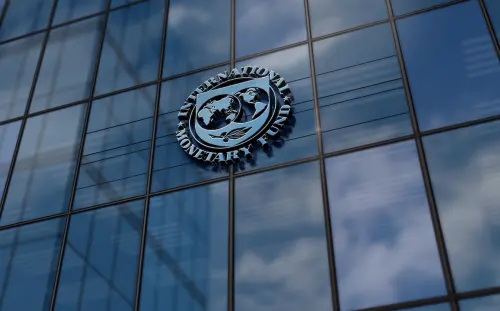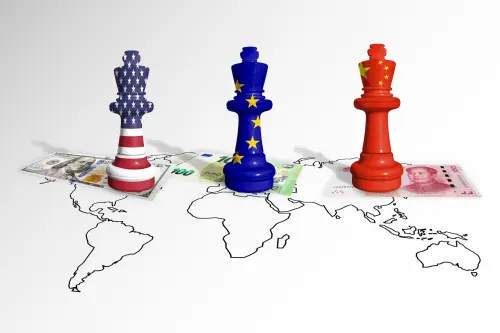A rare earthquake, registering 5.8 on the Richter scale, shook the United States’ East Coast yesterday afternoon, affecting Washington, D.C. and New York. While an earthquake of this magnitude carries only a small fraction of the force released by the mega-earthquakes experienced by Chile, Haiti, Japan and Indonesia in recent years, it did rattle buildings and nerves. In looking for an upside to the earthquake — besides the relief that there were no major injuries or damage — some may quip that the earthquake can be salutary, since Washington was in dire need of a shake-up. But with Congress in recess and lawmakers faraway, few are likely to have noticed.
It is no secret that nowadays it is politicians who — in the eyes of both voters and entrepreneurs – are regarded in particularly poor light, and I wrote about it recently. But let us face it: yesterday’s earthquake is unlikely to make any difference on the perception of a dysfunctional U.S. Congress. The required shake-up is obviously much more fundamental, and political rather than geological in nature.
Yet, could the earthquake have affected the stock market? A brief look at what transpired at the New York Stock Exchange is telling. Yesterday, at 1:48pm, a couple of minutes before the earthquake struck, the level of the Dow Industrials stood at 11,063. Right after the earthquake hit, the Dow dipped slightly, but quickly recovered and climbed substantially, to 11,177 by 4 o’clock, closing time. Consequently, the Dow closed over 100 points (a full percentage point) above the pre-earthquake level only a couple of hours earlier. Drawing conclusions from such a simple empirical observation that earthquakes can help the stock market obviously belongs on the ridiculous list, or the Economic Ridicu-list.
But, nowadays, I probably do not stand out by suggesting such a ludicrously causal link compared to the mix of statements made by politicians about the economy in recent weeks. Merely stating that “earthquake helped the stock market,” may make it onto some ridicu-list, but it would be far from the top of the “Ridicu-list of Politician’s Economic Statements.”
Lately, the competition for the top slot on this list has been fierce. For instance, the claim that Bernanke’s monetary policies at the Federal Reserve are “treasonous,” reflect not just a disregard for Shakespeare, but an utter misunderstanding of economics, finance and the Fed’s performance (which has been good). Or consider the myriad of statements about the ‘failure’ of TARP or the expenditure stimulus programs implemented by the U.S. Treasury — which actually worked, and in fact warrants renewed action at present.
Vying for the top spot on the “Ridicu-list of Politician’s Economic Statements” are also statements about the salutary effects of not raising the debt ceiling, which reflect misunderstanding about the distinction between a stock and a flow, and between past IOUs and future expenditures; or the irresponsible call for major budgetary expenditure cuts to be implemented soon, increasing the likelihood of a recession and betraying misunderstanding of the distinction between sound short- versus medium-term macroeconomic policymaking; or the notion that egregious tax loopholes for oil companies need to be protected and the misleading claim that they can make a difference in increasing aggregate demand at the macro-economic level.
One can go on and on regarding basic economic and financial fallacies that prevail nowadays. I merely want to illustrate the anti-intellectual and anti-knowledge environment that seems to have taken hold over the political discourse in Washington, adversely affecting policymaking, as well as market, citizen and corporate sentiments. This matters enormously, since such folly is already having dire consequences for the U.S. economy — including through lagging private consumer, investment and job demand — and potentially for the world at large.
Paradoxically in contrast with the United States, and unfortunately in contrast with some countries in old Europe as well, many emerging regions are exhibiting much improved macroeconomic management, reflecting learned experience, improved know-how (and its global dissemination), graduate education in top schools abroad and at home, and increased deference to technocrats on difficult economic and financial matters, particularly when economic and financial crises loom large.
In Latin America, and countries like Chile, Uruguay, Brazil, Colombia, Costa Rica, among others, politicians increasingly understand the importance of relying on hard-nosed and cold evidence, on some modicum of science and expertise — and thus on technocrats — even if some macroeconomic issues are obviously still subject to political and technical debates. These countries also pay close attention to financial markets, which provide an important signal if politicians and policymakers deviate from common economic sense.
Irrespective of ideological affiliation, politicians nowadays in many Latin American countries do understand that there is no room for “voodoo,” “supply-side,” or any other irresponsible or extreme construct for economic policy. The majority understands that when it comes to the real world and concrete policymaking on important economic issues, pragmatism and consensus-building is important. In many of these countries, any remaining divide regarding macroeconomic policy does not follow an ideological divide, but a strictly generational one instead.
Misunderstanding of economic policy fundamentals was part of a certain political class two generations ago. The younger generation not only understands the analytical and practical aspects of modern macroeconomic policymaking, but the approaches taken are common to both left- and right-of center sides of the ideological spectrum. And it is rare, though it can still happen, that politicians irresponsibly try to undermine a serious head of a central bank or a finance minister who is technocratically carrying out her or his job steering the economy.
It may be revealing for some members of the U.S. Congress to undertake a study tour of economic policymaking in such countries in Latin America.
The Brookings Institution is committed to quality, independence, and impact.
We are supported by a diverse array of funders. In line with our values and policies, each Brookings publication represents the sole views of its author(s).



Commentary
Unexpected East Coast Earthquake Spurs U.S. Stock Market Rally: Adding to the ‘Ridicu-list’ of Politician’s Economic Statements?
August 24, 2011